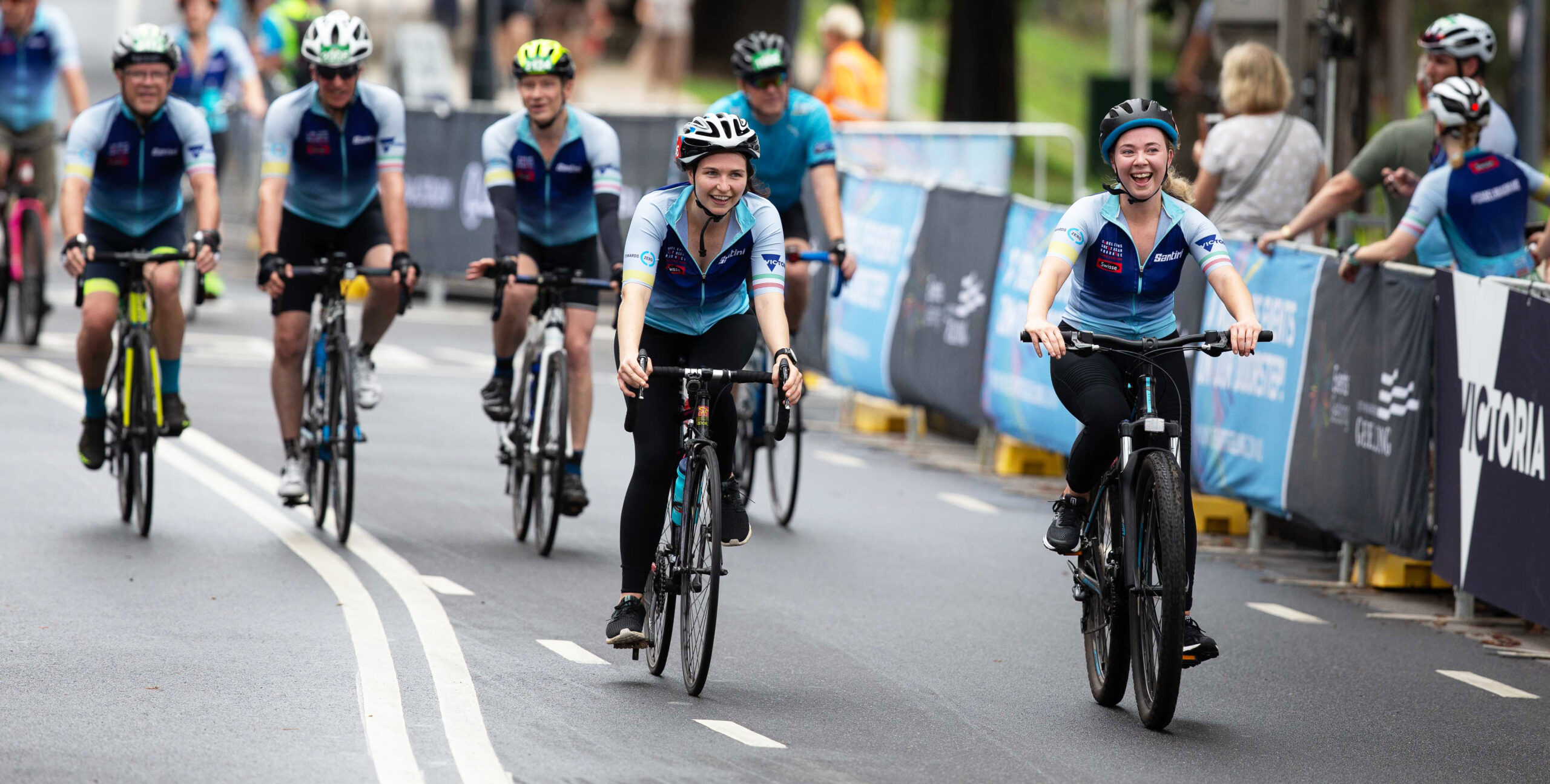There’s nothing quite as beautiful as hitting the open road on two wheels.
Whether you are learning to ride without training wheels, pedalling with a close group of friends on the weekend, or are part of the elite peloton that competes for a living, cycling is an incredible sport and a pastime with so many health and well-being benefits.
Australia’s only Tour de France Champion, Cadel Evans – and the entire team behind the Cadel Evans Great Ocean Road – are passionate about encouraging and growing participation within the sport we all love.
In Australia, we are firmly behind the push to get as many people as possible cycling, and as part of that, encouraging new participants to learn and experience the joys of riding – in particular, Australian women and girls.
Our team sat down with Associate Professor Katie Rowe from Deakin University’s Centre for Sport Research to chat about some of the work being done across the industry to support participation, with a specific focus on women and girls.
“Any activity is great activity,” Associate Professor Rowe said.
“As a society, we want people to be active to help them achieve their personal health or fitness goals, as well as experience the social benefits of exercise – and recreational cycling is a great outlet for that.”
But for women and girls, there are several barriers that stand in the way of becoming a regular cyclist, as Associate Professor Rowe explains.
“We always use the phrase ‘it’s like riding a bike’ but, in actual fact, riding a bike has become quite a complex thing.
“There’s a lot of assumed knowledge around cycling. When you consider what it takes to maintain and service a bike, things like changing a tyre or taking the wheel off to transport it somewhere. And there are other considerations such as navigating chaotic traffic, pedestrians or riding alongside other cyclists – there’s a required amount of confidence to be able to ride safely on a road.
“A lot of people grow up riding, but then you hit your teens and you are pushed onto the roads. Riding is very different when you are an adult, and the skills required may not be taught if you don’t have a buddy to walk you through and teach you those things.
“So, the barriers women face include the skills, knowledge and confidence required to be able to hit the road safely.”
Associate Professor Rowe’s PhD in this area included a qualitative study, which looked at 33 Victorian-based women aged from their early 20s to over 70-years-old. The women took part in an AusCycling skills program that was designed to enhance practical skills and confidence.
“These sessions would look at basic maintenance and some of the things a prospective cyclist might need to do if they get stuck riding on their own somewhere – aiming to help them become more self-sufficient, confident and independent on a bike.”
Associate Professor Rowe found that efforts to create a sociable and friendly environment were critical to maintaining interest and developing cycling knowledge.
“Building a social support network is really vital. It’s about being empathetic and approachable so others can feel safe to participate and improve over time.”
Associate Professor Rowe pointed to some of the great initiatives and resources that are now available to help grow grassroots sports and cycling, such as AusCycling’s Ride Nation campaign, VicHealth’s This Girl Can initiative and independent projects such as Wheel Women.
“There’s a lot of great work across the board – from government, sport organisations and institutions such as Deakin, as well as individuals and communities self-organising, taking the initiative and fostering a positive culture within the sport. So, whether you are looking to get active or moving on to more structured forms of activity such as clubs or mass participation rides, there’s now something for everyone.”
As the naming rights partner of the Elite Women’s Road Race, Deakin has been a partner of the Cadel Evans Great Ocean Road Race since 2016 and has a proud history of supporting women’s sport.
Putting the spotlight on women’s cycling and drawing spectators and competitors to Geelong’s iconic Surf Coast, the Deakin University Elite Women’s Road Race ensures Australia’s best female cyclists receive the recognition and support they deserve as thousands of spectators and TAC People’s Ride participants line the streets on Saturday 28 January.
As a global leader in sport education, research conducted at Deakin’s Centre for Sport Research aims to improve the health and performance of people and organisations across sport, with a particular focus on inspiring more women to be involved in sport at every level.
The Cadel Evans Great Ocean Road Race is proud to present opportunities for recreational cyclists to experience one of the world’s great rides – the TAC People’s Ride – where everyday cyclists have the chance to pedal the same roads as the professionals.
With riders as young as six-years-old taking part in the VEGEMITE Family Ride on the Friday evening, the event creates lifelong cycling memories for families alongside one of Australia’s greatest-ever cyclists, Cadel Evans.
“I’m heading down to take part in the TAC People’s Ride,” Associate Professor Rowe says.
“Having these social events is great because it gives people a goal to work towards – whether it’s stepping up their distances or the degree of difficulty of the ride, weekends like this are a really beneficial way of keeping people engaged and active.
“There are lots of staff, students and alumni from Deakin taking part, so it’ll be great to see the turnout and be a part of a fantastic celebration of cycling.”
The 2023 Cadel Evans Great Ocean Road Race will be held from January 27 – January 29, with the Deakin University Elite Women’s Race set for Saturday January 28.
